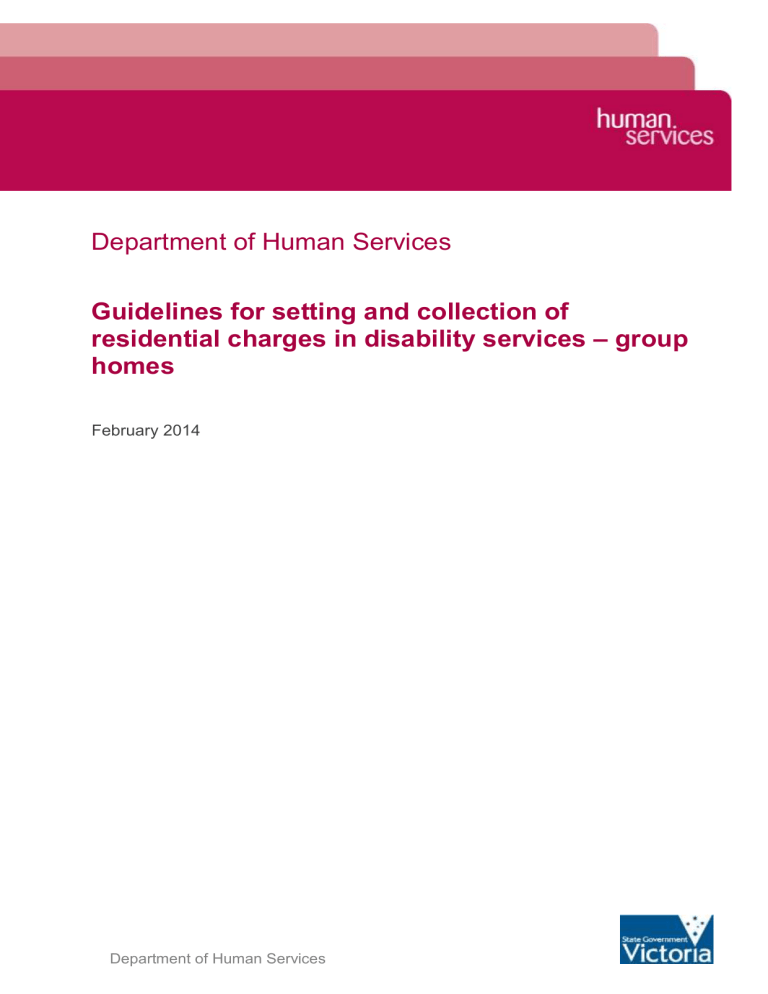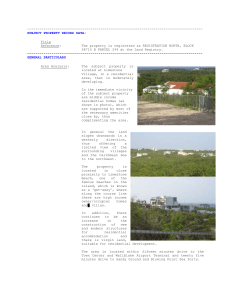Guidelines for setting and collection of residential charges in

Department of Human Services
Guidelines for setting and collection of residential charges in disability services – group homes
February 2014
Department of Human Services
Unless indicated otherwise, this work is made available under the terms of the Creative Commons
Attribution 3.0 Australia licence. The licence DOES NOT apply to any software, artistic works, images, photographs or branding, including the Victorian Coat of Arms, the Victorian Government logo and any
Victorian Government departmental logos.
To view a copy of this licence, visit creativecommons.org/licenses/by/3.0/au
It is a condition of this Creative Commons Attribution 3.0 Licence that you must give credit to the original author who is the State of Victoria.
Authorised and published by the Victorian Government, 1 Treasury Place, Melbourne.
ISBN 978-0-7311-6678-7 (online)
Contents
6. Frequency, timing and process for variations to residential charges ..................... 9
This page has been left blank intentionally
Context statement
The Disability Act 2006 (the Act) provides a framework for a whole-of-government and whole-ofcommunity approach to enable people with a disability to actively participate in the life of the community.
The Act is guided by the principles of human rights and citizenship, and gives specific rights to people residing in residential services, while recognising the demands of providing disability services throughout
Victoria.
The Disability Amendment Act 2013 (the Amendment Act) commenced on 18 December 2013. The
Amendment Act makes minor amendments to the Act to clarify the role of the Victorian Civil and
Administrative Tribunal (VCAT) in relation to review of a notice of a proposed increase of a residential charge. The Amendment Act provides that VCAT must dismiss an application if a proposed residential charge does not exceed the amount of the Commonwealth rent assistance allowance and/or the percentage cost of living increase to the Commonwealth disability support pension, and is equivalent to or below the prescribed amount in the Disability Regulations 2007.
These guidelines have been reviewed to incorporate the amendments to the Act.
Definitions
‘Common area’ means any area in which facilities are provided for the use of residents otherwise than as part of the room which the resident occupies.
‘Facilities’ means: a. land or buildings intended for use for storage space or car parking b. laundry facilities c. cooking facilities d. recreational areas e. garbage storage and disposal facilities f. bathroom, toilet and washing facilities g. appliances for heating or cooling premises h. communications facilities i. j. lawns, gardens and outhouses stairways provided for the use of a resident otherwise than as a part of the room.
‘Fee-for-service’ means an agreed payment, in addition to the residential charge, paid to a service provider for the provision of a service, for example a fee for provision of transport services.
‘Group home’ means a residential service that is declared to be a group home under section 64 of the
Act.
‘Premises’ means a structure that is designed to be used for human habitation and the area outside that structure which is part of the property on which the premises is located and includes the room occupied or to be occupied by a resident, any common areas and any facilities.
‘Prescribed amount’ in relation to a proposed residential charge, is the amount prescribed in the
Disability Regulations 2007. The current prescribed amount is equal to the sum of 75 per cent of the
1
Commonwealth disability support pension and 100 per cent of Commonwealth rent assistance received by the person to whom the proposed residential charge relates.
‘Rent component’ means an amount for the use by a resident of the room, any common area and the premises. The rent component may include costs for reasonable and necessary maintenance to a resident’s room, a common area (such as gardens, lawns and courtyards) and the premises.
‘Resident’ means a person who receives disability services in a residential service.
‘Resident’s administrator’ means the resident’s attorney appointed under an enduring power of attorney to administer the resident’s property, or a person appointed by a court or tribunal, such as the
Victorian Civil and Administrative Tribunal, as the administrator of the resident’s property.
‘Resident’s guardian’ means the resident’s guardian appointed under the Guardianship and
Administration Act 1986 or appointed by a court and, if the resident is a child, includes the child’s guardian whether or not the natural parent of the child.
‘Residential charge’ means a charge comprising the rent component or both the rent component and the services component.
‘Residential service’ means residential accommodation:
- provided by, on behalf of, or by arrangement with a disability service provider, and
- provided as accommodation in which residents are provided with disability services, and
- supported by rostered staff that are provided by a disability service provider, and
- admission to which is in accordance with a process determined by the Secretary of the Department of
Human Services (the department).
‘Room’ means a room in a premises where the room is occupied or intended to be occupied by a person who has a right to occupy the room for the purpose of a residence together with a right to use in common with others common areas in the premises.
‘Services component’ means an amount for whichever of the following service items are provided to a resident: a. utilities (for example gas, electricity and water) b. communications including telephone c. bedding and linen (for example blankets and sheets, pillows, bathroom towels and tea towels) d. food e. general household consumable supplies (for example washing detergent, cleaners) f. communal furnishings and whitegoods (for example fridges in communal kitchens or sofas in communal living rooms etc) g. household equipment and utensils (for example vacuum cleaners, dusters, cooking utensils etc) h. replacement of items specified in sub-paragraphs (b), (c), (e), (f), or (g) following wear and tear or accidental damage.
‘VCAT’ is the Victorian Civil and Administrative Tribunal that can appoint guardians and administrators for persons with a disability over the age of 18 years. VCAT may appoint any suitable person as guardian including family members or the Public Advocate; or as administrator including family members or companies such as the State Trustees.
2
Application of the guidelines
These guidelines are made pursuant to section 65 of the Act, whereby the Secretary of the Department of
Human Services (the department) may make and publish guidelines with respect to residential charges.
These guidelines are provided to assist disability service providers with the setting and collection of residential charges applicable to residents of group homes.
The guidelines set out:
- Items that must be included in an organisation’s residential charges policy as specific requirements of the Act.
- Items that should be considered as ‘good practice’ to ensure that residents receive and act on the best possible information and that this is consistent across the sector.
These guidelines apply to disability residential services that have been declared as group homes under section 64 of the Act.
Provision of information
The provision of any advice, notification or information to residents in relation to residential charges should be undertaken in line with the requirements of section 7 of the Act, which provides:
1. The contents of any advice, notice or information given or provided to a person with a disability under the Act must be explained by the person giving the advice, notice or information to the maximum extent possible to the person with a disability in the language, mode of communication and terms which that person is most likely to understand.
2. An explanation given under (1) must, where reasonable, be given both orally and in writing.
3. If a person appears to be incapable of reading and understanding the information provided, the disability service provider must use reasonable endeavours to convey the information to the person in the language, mode of communication or terms that the person is most likely to understand.
4. The disability service provider may give a copy of the advice, notice or information to a family member, guardian, advocate or other person chosen by the person with a disability. Where no person is chosen, the information may be given to a person the disability service provider considers can assist the person with a disability. The person must not be employed by, or be a representative of, the disability service provider.
It is important that families are supported to participate in the life of the individual in order to foster positive and cooperative partnerships between family and disability service providers. This is of particular importance with respect to assisting the individual to understand their rights and responsibilities, and the support available to them.
It is important, however, that all parties are mindful of respecting the wishes of the individual accessing services.
3
4
Objective
The objective of these guidelines is to provide a clear and transparent framework for the setting and collection of residential charges in group homes and to support the provision of quality, sustainable disability services.
Key guideline principles
The principles underpinning these guidelines:
- Residents who live in department-managed or funded group homes are expected to contribute towards the cost of their daily housekeeping expenses (such as food and utilities) in a comparable way to other members of the community.
- Residential charges should be set to result in a reasonable contribution towards the cost of the rent component, or the rent and services component of running a group home.
- Residential charges should enable residents to retain some disposable income to support their participation in the community and pursuit of individual goals.
- The level of residential charge should reflect the income available to residents, primarily the
Commonwealth disability support pension and Commonwealth rent assistance.
- Residential charges should be transparent. The rent, or rent and services components to be provided for in the charge, must be made clear. Service providers must provide information to residents outlining the basis of the charge and the process for increases to the charge.
- The collection of payments should be administered efficiently and attempts made to minimise the cost of administration.
- Services should not be refused on the basis of inability to pay, however residents claiming incapacity to pay need to demonstrate this through the application of undue financial hardship provisions.
Disability service providers should ensure a process to consider these issues is in place and communicated to residents, their guardian, or administrator.
- Residents in receipt of compensation will be charged the full cost of service provision to the extent that the financial settlement provides for their disability support.
- The residential charge should make a reasonable contribution toward financial viability and sustainability of the service system.
Key guideline elements
The Act sets out the following key elements in respect of residential charges:
1. There are two principal components of the residential charge: the rent component and the services component. A residential charge may be set on the basis of the rent component or a combination of the two components (section 57).
2. The residential statement, which must be provided to each resident when they commence residing at the group home, must specify the amount of the residential charge and what the residential charge will cover in terms of rent and services (section 57).
3. Disability service providers must give at least 60 days notice in writing of any proposed increase to the residential charge (including both rent and services component) to the resident and their guardian or administrator (section 66).
4. If a disability service provider p rovides an additional service item to the resident at the resident’s request, the disability service provider may increase the residential charge without notice if the amount of the increase relates only to the services component. However, as good practice, residents should still be advised in advance in these circumstances (section 66).
5. When the service items provided in the services component of the residential charge are reduced, the residential charge must be reduced by an amount agreed between the resident and the disability service provider. In instances where agreement cannot be reached either the resident or the disability service provider can apply to VCAT to have the matter determined (section 70).
6. If a resident has a dispute in respect of a notice of increase in the residential charge, the resident may apply to VCAT for a review of the decision to issue the notice within 28 days (section 71).
VCAT must dismiss an application if the proposed charge:
- does not exceed the prescribed amount being equal to the sum of 75 per cent of the
Commonwealth disability support pension and 100 per cent of Commonwealth rent assistance received by the person to whom the proposed residential charge relates, and
- does not exceed an amount equivalent to Commonwealth rent assistance allowance and/or the percentage cost of living increase to the Commonwealth disability support pension (section 72A).
7. A disability services provider must institute and operate a system to receive and resolve complaints made to that provider, in respect of disability services they provided. A contracted service provider, or a funded service provider, must also institute and operate a system to receive and resolve complaints made to that provider, in respect of services they provided to persons with a disability
(sections 104 and 106A).Residential charges policy
Each disability service provider should maintain an up-to-date policy document on residential charges for their organisation. The policy document is an integral part of information provision to service users, their guardians and administrators.
A residential charges policy needs to set out:
1. the amount and the basis of the residential charge
2. the services, including the level or amount, to be provided for that charge
3. the payment and receipt of residential charges
4. the frequency, timing and process for residential charges increases or variations
5. a process for consideration of undue financial hardship where there is demonstrable and genuine difficulty in payment
6. a process for dealing with non-payment of residential charges
7. the grievance or complaints process that applies within the organisation.
5
6
1. The amount and basis of the residential charge
There are two principal components of the residential charge: the rent component and the services component. A residential charge may be set on the basis of the rent component or a combination of the two components.
Service providers need to review their policy including the current range of service items provided service levels and associated costs, taking into consideration these guidelines and the requirements of the Act.
A resident may apply to VCAT for a review of a proposed increase in a residential charge. VCAT may find an increase is excessive if it is above the amount prescribed in the Disability Regulations 2007.
The prescribed amount is an amount equal to the sum of
75 per cent of the Commonwealth disability support pension and 100 per cent of Commonwealth rent assistance received by the person to whom the proposed residential charge relates.
Disability service providers generally use one of three methods of setting a residential charge. These are:
- a flat rate/fixed charge;
- a percentage of the Commonwealth disability support pension; or
- a percentage of the Commonwealth disability support pension and Commonwealth rent assistance.
Organisations need to ensure that residents and their administrator or nominated representative understand how the residential charge has been set and what service components it includes.
The key guideline principles state that residential charges should reflect the income available to residents, primarily the Commonwealth disability support pension, Commonwealth rent assistance and any other allowances.
2. The range and level of services to be provided
Where a residential charge includes a services component, the residential charges policy should detail which service items will be provided.
Only those service items set out in the Act can be included as part of the services component of a residential charge. These are: a. utilities (for example gas, electricity and water) b. communications including telephone c. bedding and linen (for example blankets and sheets, pillows, bathroom towels and tea towels) d. food e. general household consumable supplies (for example washing detergent, cleaners) f. communal furnishings and whitegoods (for example fridges in communal kitchens or sofas in communal living rooms etc)
g. household equipment and utensils (for example vacuum cleaners, dusters, cooking utensils etc) h. replacement of items specified in sub-paragraphs (b), (c), (e), (f), or (g) following wear and tear or accidental damage.
Usually the services component of a residential charge is calculated on the basis of averaging total costs of specified service items equally between all residents in the one household, or across all households.
Where a resident is only making a contribution towards meeting the total cost of provision of a service item or range of service items, it is acceptable practice for the disability service provider to set a fixed
‘inclusive’ residential charge based on the average of total costs between residents in a specific group home, or across group homes.
It is impractical and administratively costly for a service provider to track costs of service items relative to individual residents (for example, utility usage). It is therefore not required to list the cost of every individual service item.
It is not expected that a service provider would vary the residential charge on an individual basis for normal fluctuations in service item levels (for example, fluctuations in utility usage across different months).
However, where there is a permanent decrease in a service item level that is not offset by an increase in another service item, the charge should be varied accordingly.
2.1 Fee-for-service charges
Disability service providers may provide a range of additional services to residents on a fee-for-service basis, outside of the residential charge. Such additional services need to be agreed by both parties and should be included in the residential statement. Where there is a fee-for-service item, for example transport, the amount of the charge must be itemised separately.
Residents should also be advised if they are required to reimburse the disability service provider for incidental items based on ad-hoc usage. For example, a disability service provider may include local telephone calls and line rental as part of the services component of the residential charge, but international phone-calls may be charged on a fee-for-service basis.
2.2 Reducing service items
Section 70 of the Act requires that the residential charge must be reduced if service items provided in the services component are reduced. The Act defines a reduction in service items included in the residential charge as a: a. reduction of a service item by reducing the level or range of services provided in that item b. termination in the provision of a service item.
Where a residential charge is based on full cost recovery and service items are reduced, the disability service provider must reduce the residential charge by an amount agreed with the resident. In the event of no agreement being reached, either the resident or the disability service provider may apply to VCAT for a determination of the amount of adjustment.
A disability service provider will need to demonstrate to VCAT why the residential charge should not be reduced, for example evidence that, while residents are making a reasonable contribution towards meeting the total costs of the service items included in the services component, there remain significant costs to be borne by the service provider.
7
8
A reduction in the amount or level of a fee-for-service item should be agreed with the resident and included in the residential statement.
3. Residents who receive compensation
Residents who receive compensation (for example traffic accident commission compensation or insurance payments) are required to pay the full cost of residential and support services provision to the extent that the financial settlement provides for their disability support.
Prior to a person moving into a residential service, matters regarding any applicable financial settlement need to be discussed and determined by the person and their administrator, the disability service provider and the department. Service providers should ensure that their residential charges policy incorporates guidelines in relation to this principle.
4. Intentional damage of property
Section 59 of the Act specifies duties of residents, including the duty of a resident to notify the disability service provider of any damage caused knowingly and intentionally which is not the result of fair wear and tear, and contribute to the cost of repairing that damage.
In issuing charges for intentional damage, service providers need to ensure adequate provision of information to the resident, their guardian or administrator, including details of the incident, parties involved, estimated cost of damages, and how this value has been derived.
5. Payment and receipting of residential charges
The Act requires disability service providers to provide details in the residential statement of the amount of the residential charge, including the frequency of payment and the preferred method of payment.
These details should be reflected in the organisation’s residential charges policy document.
Section 67 requires that the disability service provider must not require a resident to pay the residential charge more than 30 days in advance.
Section 69 requires a disability service provider to provide a written receipt to the person making a residential payment:
- immediately, if the payment has been made in person; or
- if the payment is not made in person, within 30 days of receipt of the residential charge if the person requests a written receipt at the time of payment .
The format of the receipt is specified under the Act and must indicate the:
- name of the resident
- name of the disability service provider
- location of the group home
- date payment was received
- period for which the payment was made
- amount paid
- rent or services components, or both, covered by the payment.
Where a residential charge is not paid in person and a written receipt is not requested, the service provider must keep a record of the payment for 12 months after receipt of the payment.
If the resident requires a copy of the record before the end of the 12-month period, the service provider must provide a copy of the record of payment within 30 days of receiving the request.
There are penalties associated with non-compliance with the receipting requirements of the Act specified above.
6. Frequency, timing and process for variations to residential charges
Section 66 of the Act requires a disability service provider to give the resident, their guardian or their administrator written notice of a proposed increase in the residential charge. This notice must be given at least 60 days before the date of the increase. Calculation of the notice period excludes the issue date and end date of the notice period, that is, day one is the day after the date of issue and the implementation date is the day after the end date.
The rental component of the residential charge must not be increased at intervals of less than six months. f a disability service provider provides an additional service item to the resident at the resident’s request, the disability service provider may increase the residential charge without notice if the amount of the increase relates only to the services component. It is advisable that both parties agree to the additional cost and when the increase in service provision and payment should commence.
A ‘Notice of increase in residential charge’ pro-forma is available for use by all disability service providers
– refer Attachment
A
.
A notice of increase in residential charge, including any written advice regarding a variation to charges and service levels provided in accordance with the Act is deemed as an update to the residential statement. A copy of the notice of increase in residential charge may be attached to the resident’s residential statement as a record.
7. Disputes relating to a notice of increase in residential charge
If a resident is concerned about a proposed increase in the residential charge, they should raise the issue with the disability service provider in the first instance. The service provider must ensure that residents and their guardian or administrator are provided with information and assistance to understand the reasons for the increase in the residential charge.
9
If the resident wishes to seek VCAT review, they must make an application within 28 days of the issue of the notice of increase. Disability service providers must be mindful of this time limit when addressing the initial concern.
Orders VCAT can make when a review is sought
When an application for review is made under section 72(1) VCAT may:
- make an order that a proposed residential charge is excessive
- make an order that for a specific period (not exceeding twelve months) the residential charge cannot exceed a specific amount
- dismiss an application.
If a resident applies to VCAT for a review of a notice of increase, VCAT will consider a range of factors, including what is being paid by residents of similar group homes in similar locations and the number and size of increases in the preceding 24 months (section 72(2)).
The amount specified under such an order cannot be less than the resident was being charged before the notice of the proposed increase was given.
Any increase to a residential charge that results in the charge being higher than the amount prescribed in the Disability Regulations 2007, or above cost of living increases to the Commonwealth disability support pension and Commonwealth rent assistance, needs to be justified by the cost of service components.
In the following sections, Commonwealth disability support pension and Commonwealth rent assistance are referred to respectively as DSP and CRA.
VCAT must dismiss an application in some circumstances
VCAT must dismiss an application if a proposed residential charge does not exceed a threshold equivalent to:
- CRA and/or
- the percentage cost of living increase to the DSP, and
- does not exceed the prescribed amount in the Disability Regulations 2007.
Three formulae can be applied by VCAT
Section 72A of the Act contains three formulae that VCAT uses to determine the threshold under which it must dismiss an application. These formulae are based on the three methods generally used by disability service providers to set residential charges. In such determinations, VCAT must not have regard to the factors set out in section 72(2).
Where the proposed residential charge exceeds the amount prescribed in the Disability Regulations
2007, or exceeds the amount determined by the relevant formula, VCAT can make any of the orders set out in section 72(1) of the Act outlined above.
The formulae take account of cost of living increases to the DSP and CRA. From time to time the
Commonwealth Government introduces additional allowances such as the pension supplement or clean energy allowance. These allowances are on top of the base pension and are not included in the formulae.
10
How do the section 72A formulae operate?
For each of the three formulae, the following applies:
PC is the previous charge
D1 is the maximum DSP on the day on which the notice is issued
D2 is the maximum DSP on the previous charge day
C is the maximum CRA on the day on which the notice is issued multiplied by 26
C1 is the amount that was included in the previous charge and determined on the basis of the whole or any part of CRA.
C2 is the maximum CRA on the day on which the notice is issued multiplied by 26
1. A percentage of the DSP
(PC X (D1 ÷ D2))+C This formula is relevant where the residential charge is based on the DSP only, and the proposed charge is a charge based on CRA and DSP.
PC is the previous charge that is proposed to be increased and is identified as an annual amount.
The division of D1 by D2 in the formula creates a percentage that reflects the relevant percentage increase of the DSP. This allows for a proportional increase to the residential charge.
CRA is determined as a fortnightly payment. The Amendment Act specifies that the previous and proposed residential charges are calculated annually. Therefore the formula provides that C , which reflects the CRA, is multiplied by 26 to determine an annual amount.
2. A percentage of the DSP and CRA
(PC – C1) X (D1 ÷ D2)) + C2 This formula is relevant where the residential charge is based on CRA and DSP and the proposed charge will also be based on CRA and DSP.
The proposed charge will not exceed the amount determined by this formula if the increase of the previous charge ( PC ) minus C1 (which is any amount in that charge that reflected CRA) does not exceed the percentage increase of the DSP since the charge was last set or increased ( D1÷D2 ), plus 100% of the new maximum CRA amount ( C2 ).
3. A flat rate/fixed charge
PC X (D1 ÷ D2) Applies to all other cases (for example, where the charge is fixed).
The proposed charge will not exceed the amount determined by this formula if the increase does not exceed the percentage increase of the DSP ( D1 ÷ D2 ) since the previous charge ( PC ) was last set or increased.
11
8. Process for consideration of undue financial hardship
Residential services should not be refused on the basis of genuine inability to pay. Residents who claim incapacity to pay need to demonstrate this through the application of undue financial hardship provisions.
Disability service providers should ensure a process is in place to consider these issues. This policy is to be communicated to residents and their guardian, administrator or nominated representative.
More information can be found in the department’s Undue financial hardship guidelines January 2014 .
9. Non-payment of residential charges
Where financial hardship is not demonstrated and the resident, guardian, administrator or nominated representative has failed to pay the residential charge, the disability service provider has the right under section 76(1)(g) to issue a notice to vacate. When a notice to vacate is given, it must be provided to the resident, and the resident’s guardian or administrator (where a guardian or administrator is appointed).
The department and the Public Advocate must be notified of the details of the notice within 24 hours of it being given. The resident has the right to seek a review by VCAT within 28 days of receiving a notice to vacate.
The disability service provider should have in place a policy for following up and collection of outstanding debts. Reasonable communication and support should be provided to the resident and their guardian, administrator or nominated representative to clarify the reason for the outstanding debt and, where appropriate, opportunity to develop an agreed payment plan to discharge the debt. Support and timelines need to take into account the resident’s support needs, the financial administration arrangement in place and the financial position of the resident. A notice to vacate for not paying a residential charge should not be issued until the policy has been followed and corrective actions have failed.
Where an administrator is not discharging the resident’s financial responsibility to pay the residential charges, the matter should be referred through management to VCAT for review under section 56 of the
Guardianship and Administration Act 1986
.
A ‘Notice to vacate’ pro-forma is available for use by all disability service providers – refer Attachment
B
.
It is a legislative requirement that a notice to vacate for failure to pay residential charge must specify a termination date that is not less than 60 days after the date on which the notice is given. Calculation
of the notice period should exclude the issue date and end date of the notice period. That is, t o ensure a full 60 days notice is given, the termination day specified on the notice should be at least 62 days from the day on which the notice is given. Enforcement of a notice to vacate should not commence until after the termination date specified.
When a notice to vacate is issued, a residency is terminated on the earliest of the following:
- the day on which the resident vacates the room and group home, or
- VCAT makes a possession order.
12
10. Grievance or complaints process
Section 104 of the Act requires a disability services provider to institute and operate a system to receive and resolve complaints about disability services provided by them. Under section 106A, a contracted service provider, or a funded service provider, must also institute and operate a system to receive and resolve complaints about services they provided to persons with a disability.
There are severe penalties (120 penalty units) associated with non-compliance with the internal process for complaints set out in the Act.
The Act also provides that any person may make a complaint to the Disability Services Commissioner
(section 110). For further information see: http://www.odsc.vic.gov.au/contact-us
If a resident has a dispute in respect of a notice of increase in the residential charge, the resident may apply to VCAT for a review, as outlined in section 7 above. For further information see: http://www.vcat.vic.gov.au/disputes/residential-tenancies
Related policies, procedures and legislation
- Disability Act 2006
- Disability Amendment Act 2013
- Rights and accountability – management of money policy date http://www.dhs.vic.gov.au/__data/assets/pdf_file/0003/666813/prm_rightsaccountmanagemoney_pdf
_0410-updated.pdf
- Guardianship and Administration Act 1986
- Department of Human Services standards date
- Department of Human Services policy and funding plan 2012-2015
- Undue financial hardship guidelines date
Further information
For further information and advice contact your local area connections unit.
Approved
Approved by the Secretary to the Department of Human Services May 2014.
13
Attachment A
Notice of an increase in the residential charge
Disability Act 2006 section 66
From: <Name of disability service provider>
To:
Cc:
<Resident>
<Resident’s guardian or administrator>
<Property no. and street name>
<Suburb>
<State> <Postcode>
Re: <Resident’s name>
Residential charge at group home at:
<Property no. and street name>
<Suburb>
<State> <Postcode>
Under the terms of the Disability Services Act 2006 (the Act) you are advised that the residential charge for the above property will increase from <$X> per fortnight/per month to <$Y> per fortnight/month from the <date 60+ days from date of issue unless the increase is in response to the provision of an additional service item at your request>.
(The components included in the charge remain as set out in the residential statement.)
(This increase is as a result of adding <item> to the services provided in the residential statement).
(delete as appropriate)
If you have a concern about this, please speak to your service provider in the first instance. You may apply to the Victorian Civil and Administrative Tribunal (VCAT) Residential Tenancies List for a review of the decision to increase the charge. An application must be made within 28 days of being issued with this notice.
(Signed)
(Print name)
(Position title)
For and on behalf of <insert name and address of disability service provider>
Date of issue: / /
14
Attachment B
Notice to vacate
Disability Act 2006 section 76
To: <Resident’s name>
Group home address: <Property no. and street name>
<Suburb>
<State> <Postcode>
Cc: <Resident’s guardian or administrator>
Under the terms of the Disability Services Act 2006 (the Act) you are hereby given notice to vacate the group home at the above address. This notice has been issued because:
- you have failed to pay the residential charge
Particulars: <insert details of the failure to pay, eg. total amount owing and time since last payment and measures taken to collect payment>
The Act requires me to give you at least 60 days notice to vacate in these circumstances. The termination date is <insert date>, which means that you must vacate the group home by that date. (Notice to service providers: It is a legislative requirement that a notice to vacate must specify a termination day that is not less than 60 days after the d ate on which the notice is given. To ensure a full 60 days’ notice is given, the termination day specified on the notice should be at least 62 days from the day on which the notice is given. Enforcement of a notice to vacate should not commence until after the termination date specified.
More time must be allowed if the notice is posted – you must take into account these extra days – allow at least two business days after the notice was posted).
The Secretary, Department of Human Services and the Office of the Public Advocate will, in accordance with section 76(7) of the Act, be advised that you have been issued with this notice.
You may wish to seek the support of a disability advocacy organisation. The Disability Advocacy
Resource Unit website has a list of advocacy organisations and is located at website www.daru.org.au.
If you would like further information about your residency rights contact Consumer Affairs Victoria on
1300 558 181.
If you believe that this notice to vacate is not valid for any of the following reasons: a. a defect on the face of the notice (for example, it was not filled out correctly) b. the notice was not issued in accordance with this Act c. the ground on which the notice was issued is not established, you may apply to the Victorian Civil and Administrative Tribunal (VCAT) for a review. An application to
VCAT must be made within 28 days of the day on which you received the notice.
(Signed) ______________________________________________________
15
(Print name) __________________________________________________
(Position title) _________________________________________________
For and on behalf of <insert name and address of disability service provider>
Date of issue: / /
16








